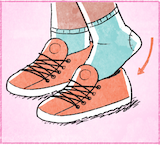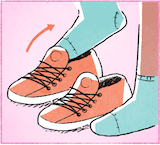


นี้คืออี่หยัง อันนี้คือเกิบ อันนี้เป็นเกิบ เป็นเกิบโบก
เกิบโบกมีจักกิ่ง เกิบโบกมีสองกิ่ง คู่หนึ่ง เกิบคู่หนึ่งสิมีสองข้างหลือว่าสองกิ่ง
อันนี้กะเป็นเกิบโบก เกิบโบกคู่สีแดง งามคัก งามอี่หลี
แล้วเกิบคู่นี้เป็นเกิบของใผ จักคือกัน จักว่าเกิบคู่นี้เป็นของพุใด จักพุใดมาถอดถิ้มไว้นี้ จักพุใดมาถอดถิ้มวางไว้นี้
10
เขากำลังเฮ็ดหญัง เขากำลังสิใส่เกิบ
มีคนคนหนึ่ง เขากำลังสิใส่เกิบ ฝั่งขวาเขาใส่ได้แล้ว อีกฝั่งซ้ายเขาทันได้ใส่เกิบ เขากำลังสิสุบใส่ลงไป
เขาใส่เกิบจักคู่ ใส่คู่เดียว คนหนึ่งใส่เกิบได้คู่หนึ่ง เพาะว่าคนหนึ่งกะมีสองตีน เกิบคู่หนึ่งกะมีสองข้าง กะใส่ได้สองตีนหลือว่าคนหนึ่งพอดี
ก่อนสิใส่เกิบ เขาคนนี้กะใส่ถุงเท้าพ้อม ถุงเท้าหลือว่าถุงตีนนั้นหละ เขาใส่ถุงเท้าพ้อม ถุงเท้าคู่สีเขียวพุ้นเด่ะ แล้วเขากะสิใส่เกิบ เขาใส่ถุงเท้าแล้วเขากะสิใส่เกิบ
11
เขากำลังสิเฮ็ดหญัง เขากำลังถอดเกิบ คนคนนี้เขากำลังสิถอดเกิบ
เป็นหญังเขาคือถอดเกิบ เขาอาดสิเซาใส่เกิบแล้ว เขากะเลยสิถอดเกิบ
เขาถอดเกิบจักข้าง กะถอดเทิงสองข้าง เพาะว่าเขาบ่ใส่เกิบแล้ว เขากะต้องถอดเกิบ ขั้นสิถอดกะถอดเทิงข้าง เขาบ่ถอดข้างเดียว เพาะว่าเขาต้องถอดออกให้มันเบิด
Link to overview page
Link to dictionary
| Isaan | Pronunciation | Tones | Thai | English/Notes |
|---|---|---|---|---|
| นี้ | ni: | HF | นี้ | 1. this 2. here |
| คือ | khʉ: | HR | คือ | 1. to be, to resemble, like, as 2. why {บักหล้าคือบ่เก็บโต่ะแน่ = [addressing a young boy] Why haven't you cleared the table?} |
| อี่หยัง | i:-yaŋ | H-M | อะไร | 1. what {นี้คืออี่หยัง = What is this?} {มื้อนี้เจ้าเฮ็ดอี่หยัง = What are you doing today?} {กินเข้างายกับอี่หยัง = What did you have for breakfast?} 2. something, anything, (in negations) nothing {บ่ต้องเฮ็ดอี่หยังอีกเลยนอกจากใส่ปุย = [we] don't need to do anything besides adding fertilizer} |
| อัน | an | M | อัน | 1. thing, object 2. general clf. for objects |
| เกิบ | gə:p | LF | รองเท้า | 1. shoe 2. general term for footwear |
| เป็น | pen | M | เป็น | 1. to be, to exist 2. to be able to 3. to suffer, sth. happens to 4. เป็นหญัง[...]คือ in initial position: why? {เป็นหญังเขากะคือแปงฟัน = Why is he brushing his teeth?} {เป็นหญังเคี่ยงบินมันคือสิตก = Why is the airplane falling down?} |
| เกิบโบก | gə:p-bo:k | LF-LF | รองเท้าบูท | boot (footwear) |
| มี | mi: | HR | มี | 1. to have 2. there is |
| จัก | jak | M | จัก | 1. answer to a question: [I] don't know, don't know exactly, [I'm] not sure {พุซายคนนี้เขาเถ้าไป่ จัก จักเถ้าหลือบ่เถ้า เบิ่งบ่ค่อยออก = Is this man here already old? I don't know. I can't see clearly whether he's old or not.} {เขาเว้ากันอยู่ใส จักคือกัน = Where are they talking? I don't know either.} 2. exact(ly), what exactly {จักต้มอี่หยังกะบ่ฮู้ = I don't know what (exactly) he is cooking} {บ่ลู้คือกันจักปาอี่หยัง = I don't know either what kind of fish this is} 3. how much/many? {ต้นไม้มีจักต้น = How many trees are there?} {ตอนนี้จักโมงแล้ว = What time is it now?} {มือของเฮานี้สิมีจักนิ้ว = How many fingers do our hands have?} 4. a bit, a little bit {จักหน่อย/จักหน่อยหนึ่ง = a bit, a little bit} |
| กิ่ง | giŋ | H | ข้าง | clf. for articles which come in pairs {เกิบคู่หนึ่งมีสองกิ่ง = a pair of shoes [consists of] two shoes} |
| สอง | sɔ:ŋ | M | สอง | two |
| คู่ | khu: | H | คู่ | 1. pair, couple 2. to be paired with |
| หนึ่ง | nʉŋ | H | หนึ่ง | 1. one 2. after adjective: intensifier {บักคักหนึ่ง = very much} {อันบักใหญ่หนึ่ง = very large}, or attenuates the meaning {กะดาดมันแผ่นน้อยๆ หนึ่ง = the piece of paper is [relatively] small} |
| สิ | si | M | จะ | future tense auxiliary {เขากำลังสิตื่น = he's about to wake up} {สิไปตะหลาด = [I'm] going to the market} |
| ข้าง | kha:ŋ | LF | ข้าง | 1. side {มีหูจับสองข้าง = there are handles on both sides} 2. next to {วางอยู่ข้างๆ ก่องใบใหญ่ = it's placed next to the large box} {เขายืนอยู่ข้างๆ อีกพุหนึ่ง = he's standing next to another person} 3. clf. for body parts which come in pairs (eyes, ears, legs etc.) {เขามีตาสองข้าง = she has two eyes} |
| หลือ | lʉ: | M | หรือ | or |
| ว่า | wa: | H | ว่า | 1. that, as {คำว่า X = the word X} 2. to say |
| กะ | ga | M | ก็ | 1. then, consequently 2. also |
| สี | si: | M | สี | 1. color 2. colored pencil, crayon |
| แดง | dɛ:ŋ | M | แดง | red |
| งาม | ŋa:m | HR | สวย | beautiful, handsome, splendid |
| คัก | khak | H | intensifier: very, very much | |
| อี่หลี | i:-li: | H-M | จริง | intensifier: really Notes: pronunciation: also realized as อี่หลิ |
| แล้ว | lɛ:o | HF | แล้ว | 1. finished 2. already 3. and then, and next (especially แล้วกะ) 4. auxiliary for past tense |
| ของ | khɔ:ŋ | M | ของ | of, belonging to |
| ใผ | phai | M | ใคร | 1. who {พุซายคนนี้เป็นใผ = Who's this boy?} 2. somebody, someone, anybody, with negative: nobody {บ่มีใผอยู่หนี้จักคนเลย = there's not a single person here} |
| คือกัน | khʉ:-gan | HR-M | เหมือนกัน | 1. also, likewise, similarly {ยินดีที่ได้ฮู้จักคือกันคับ = Nice to meet you too!} 2. in negative sentences: either {บ่ลู้คือกัน = I don't know either} {จักคือกัน = I don't know (either)} |
| พุใด | phu-dai | H-M | ใคร | 1. who {มีพุใดโทมากะบ่ลู้ = I don't know who has called} {ห้องนอนของพุใด = whose bedroom (is this)? } 2. someone, somebody, anybody, in negative context: nobody {บ่มีพุใดอยู่กับเขาเลย = there's nobody with him} |
| มา | ma: | HR | มา | 1. to come 2. auxiliary expressing action towards the present or focal time {กะคุเฮ็ดมาจากอี่หยัง = What is the bucket made of?} {แล้วเขากะเก็บเงินจากพุนั้นมา = and then she takes the money of that person} |
| ถอด | thɔ:t | LF | ถอด | to take off, to remove |
| ถิ้ม | thim | LF | ทิ้ง | 1. to leave, to abandon 2. to throw away, to discard 3. to drop, to let drop |
| ไว้ | wai | HF | ไว้ | 1. to keep, to put, to place, to retain, to save, to reserve {เขาเอาหัวของเขาไว้ใส = Where does she put her head?} {หมาสิเลี้ยงไว้บ้าน = dogs are kept/raised in the house} {ไก่เลี้ยงไว้ในคอก = chicken are kept/raised in a coop} {หน้ามันบังไว้ = the face is covered/not visible} {เขาเอาโทละสับวางไว้หู = he holds the phone to his ear} 2. for {นาลิกาปุกมีไว้เฮ็ดหญัง = What is an alarm clock for?} {หม้อเอาไว้เฮ็ดแนวกิน = a pot is used to make food} {ก่องเอาไว้เฮ็ดหญัง ก่องเอาไว้ใส่ของ = What is the box for? It's for putting in stuff.} Notes: see also ไว้ถ้า |
| วาง | wa:ŋ | HR | วาง | to place, to set/put down {โทละสับ/phone: วางสาย = to hang up} {มีเกิบวางอยู่ในก่อง = there are shoes in the box} {มือข้างหนึ่งเขาวางอยู่เทิงโต่ะ = he's put one of his hands on the table} |
| เขา | khao | M | เขา | personal pronoun: he, she |
| กำลัง | gam-laŋ | M-HR | กำลัง | auxiliary indicating continuous or progressive action |
| เฮ็ด | het | H | ทำ | to do, to make |
| หญัง | ɲaŋ | M | อะไร, เป็นหญัง = ทำไม | 1. what {เขากำลังเฮ็ดหญัง = What is he doing?} {ธูปเอาไว้เฮ็ดหญัง = What are incense sticks for?} 2. something, anything, (nothing) 3. เป็นหญัง[...]คือ in initial position: why {เป็นหญังเขาคือใส่บักพิกลงไปในกวยเตียว = Why is he putting chili in [his] noodle soup?} {เป็นหญังหน้าต่างมันคือเปิด = Why is the window open?} {เป็นหญังมันคือมีควนไฟ = Why is there smoke?} |
| ใส่ | sai | H | ใส่ | 1. to put something in/on {เขาใส่บักพิกในกวยเตียวหลาย = he's putting a lot of chili in his noodle soup} {เขาบีบยาสีฟันใส่แปงสีฟัน = he squeezes toothpaste on the toothbrush} {ก่องเอาไว้ใส่ของ = boxes are there to put stuff in} 2. to wear (clothes) {เขาใส่เสี้ยแขนญาว = he's wearing a long-sleeve} 3. directed at {เอิ้นใส่กัน = to call each other/to say to each other} {หมามันเห่าใส่แมว = the dog barks at the cat} {ล้องเพงใส่ไม = to sing into the microphone} {เขากำลังซี้มือไปใส่พุซาย = she's pointing at the man} |
| คน | khon | HR | คน | person, people |
| ฝั่ง | faŋ | H | ฝั่ง | 1. side 2. river/canal bank, shore |
| ขวา | khwa: | M | ขวา | right |
| ได้ | dai | HF | ได้ | 1. can 2. to get, to obtain 3. before verb: indicating past tense 4. บ่ได้ + verb: not |
| อีก | i:k | LF | อีก | 1. more, again 2. other, another |
| ซ้าย | sa:i | HF | ซ้าย | left |
| ทันได้ | than-dai | HR-HF | ยังไม่ได้ | not, not yet {มันทันได้เกิดขึ้น = it hasn't happened yet} {หัวหนึ่งทันได้ปาด = one [onion] hasn't been cut yet} {หมามันจับแมวทันได้ได้ = the dog hasn't been able yet to catch the cat} {เขากะทันได้เถ้า = he's not yet old} Notes: equivalent to บ่ทันได้ |
| สุบ | sup | M | สวม | to slip in/into, to insert |
| ลง | loŋ | HR | ลง | 1. to descend, to lower, to go down 2. down 3. bus/train etc.: to get off, to disembark {คนกำลังลงลดบั่ด = people are getting off the bus} 4. boat/ship etc.: to get on, to board {เขากำลังญ่างลงเลีย = he's boarding/getting on the boat} |
| ไป | pai | M | ไป | 1. to go 2. auxiliary indicating action extending into the future |
| เดียว | di:ao | M | เดียว | only, alone, single |
| เพาะว่า | phɔ-wa: | H-H | เพราะว่า | because |
| ตีน | ti:n | M | ตีน | foot |
| พอดี | phɔ:-di: | HR-M | พอดี | 1. to fit well 2. appropriate, just enough, just right {กะจกบานบ่ใหญ่ กะจกบานพอดี = not a large window, just right} {พอดีมือของเฮา = just right for his hand} 3. just in time, at the right moment, just this moment {แล้วพุซายคนนี้กะญ่างมาพอดี = and the man has come just now} |
| ก่อน | gɔ:n | H | ก่อน | 1. before 2. first, first of all |
| ถุงเท้า | thuŋ-thao | M-HF | ถุงเท้า | sock Notes: see also ถุงตีน |
| พ้อม | phɔ:m | HF | พร้อม | at the same time, also, too {มีตะเว็นพ้อม = the sun's out, too} {กะทะมีด้ามพ้อม = the pan has also a handle} |
| ถุงตีน | thuŋ-ti:n | M-M | ถุงเท้า | sock Notes: see also ถุงเท้า |
| นั้นหละ | nan-la | HF-M | นั่นแหละ | auxiliary for emphasis at the end of a phrase |
| เขียว | khi:ao | M | เขียว | green |
| พุ้น | phun | HF | นู่น | over there |
| เด่ะ | de | H | น่ะ | particle used for emphasis |
| อาด | a:t | LF | อาจ | 1. might, may, will 2. likely |
| เซา | sao | HR | จบ | 1. to stop, to be finished {น้ำมันเซาไหลแล้ว = the water has stopped flowing} {ฝนเซาตกแล้ว = it has stopped raining} {มันสิเซาเสียงดัง = (phone) it stops ringing loudly} 2. to prevent, to hinder 3. to rest {เซาเมี่ยย = to rest} |
| เลย | lə:i | HR | เลย | 1. futher on, beyond, past {เข็มน้อยเลยเลขสิบสองไป = the minute hand has passed number twelve} 2. too much 3. at all 4. definitively 5. completely, utterly |
| เทิง | thə:ŋ | HR | ทั้ง | 1. up to, all, all of, the whole of, altogether {เขาใส่กางเกงขาสั้นเทิงสองคน = both are wearing short trousers} {เขาเป็นพ่อของลูกเทิงสามคนนี้ = he's the father of these three [children] here} 2. เทิง ... เทิง ...: both ... and ..., ... as well as ... {เทิงมีใบพ้อม เทิงมีเหลียนพ้อม = there are notes as well as coins} Notes: pronunciation: also realized as ทัง |
| บ่ | bɔ: | H | ไม่ | 1. no, not 2. question particle, transforming a statement into a question Notes: spelling exception in line with common usage on social media |
| ต้อง | tɔŋ | HF | ต้อง | to have to, must |
| ขั้น | khan | LF | เมื่อ | when, if |
| ออก | ɔ:k | LF | ออก | 1. to go out, to leave 2. out |
| ให้ | hai | LF | ให้ | 1. to give {หมอกำลังเอายาให้คนป่วยกิน = the doctor is giving the patient medicine} 2. for 3. to allow, to be allowed |
| มัน | man | HR | มัน | it (also used to refer to people) |
| เบิด | bə:t/bət | LF/M | หมด | 1. completely, totally, entirely {เทิงเบิด = all of them} {เบิดมื้อเบิดค่ำ = [all] day and night} {ขั้นพุโดยสานลงลดไฟเบิดแล้ว [...] = when all passengers have disembarked […]} {เขากินเบิดบ่ = Has he eaten all of it?} 2. to be finished, to be exhausted, to come to an end, to have no more {โน่ดบุ่กแบ็ดเบิด = the notebook is out of battery/the notebook needs recharging} |